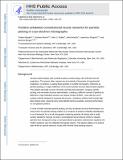Notice
This is not the latest version of this item. The latest version can be found at:https://dspace.mit.edu/handle/1721.1/136321.3
Positive-unlabeled convolutional neural networks for particle picking in cryo-electron micrographs
Author(s)
Bepler, Tristan; Morin, Andrew; Rapp, Micah; Brasch, Julia; Shapiro, Lawrence; Noble, Alex J; Berger, Bonnie; ... Show more Show less
DownloadAccepted version (36.58Kb)
Open Access Policy
Open Access Policy
Creative Commons Attribution-Noncommercial-Share Alike
Terms of use
Metadata
Show full item recordAbstract
© 2019, The Author(s), under exclusive licence to Springer Nature America, Inc. Cryo-electron microscopy is a popular method for the determination of protein structures; however, identifying a sufficient number of particles for analysis can take months of manual effort. Current computational approaches find many false positives and require ad hoc postprocessing, especially for unusually shaped particles. To address these shortcomings, we develop Topaz, an efficient and accurate particle-picking pipeline using neural networks trained with a general-purpose positive-unlabeled learning method. This framework enables particle detection models to be trained with few sparsely labeled particles and no labeled negatives. Topaz retrieves many more real particles than conventional picking methods while maintaining low false-positive rates, is capable of picking challenging unusually shaped proteins (for example, small, non-globular and asymmetric particles), produces more representative particle sets and does not require post hoc curation. We demonstrate the performance of Topaz on two difficult datasets and three conventional datasets. Topaz is modular, standalone, free and open source (http://topaz.csail.mit.edu).
Date issued
2019Journal
Nature Methods
Publisher
Springer Science and Business Media LLC